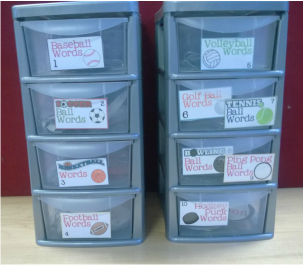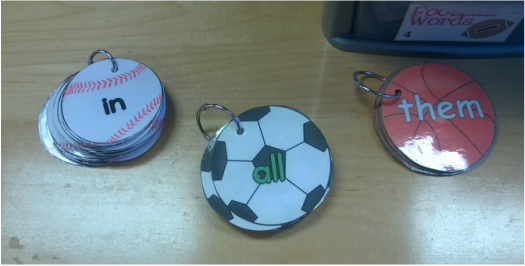
As I was listening to kiddos who are still working to master their ball words today, though, I was thinking about how we help kids develop word attack skills. My son is dyslexic, so this is an area of the curriculum that I've thought and read a lot about.
In our school, we use North Lanarkshire's Active Literacy programme, which emphasises the ability to break words down into their sounds/phonemes and 'sound words out'. Which is all well and good - but what about trickier words? And things that don't seem to follow the rules we teach our kids? And how do we help those kids who need a bit more time and more support to remember the sounds that different phonemes make?
For me, two keys have been:
1) repetition, repetition, repetition and
2) giving kids as much information as possible about the words they are reading.
When kids are practicing their sight words and get stuck, I prompt for what the phoneme says, and if possible, I link my question to words they already know (for example, every time we get stuck with 'ay', I point to the 'day of the week' up on our white board. That's usually enough to remind them that 'ay' makes the long 'a' sound, and they can figure out the word). Some kids remember phonemes very quickly. Other kids need lots of repetition before it 'sticks'.
But I also try to give them as much information about a word as I can, so that things that seem crazy 'make sense'. 'C' making an 's' sound, and 'g' saying 'j' are cases in point. When does this happen? When 'c' and 'g' are followed by 'i, e or y' (there are always exceptions, but luckily, primary 1s don't tend to pick up on them!). Now - they don't usually remember this when they are spelling the words (nise, anyone?), but when they are reading, these words don't confuse them. There is a rule that helps them make sense of it. And I've repeated that rule so often, it's stuck in the back of their memory somewhere, ready to be dragged out with a prompt or two.
The more information we can give our kids to take the 'mystery' out of reading, the better. This year, we've also spent a lot of time talking about vowels and just what tricky little letters they are...if we sound out a word and it doesn't make sense, chances are, that vowel (or two) isn't playing by the rules and is making a different sound. There isn't always a rule for that one - but at least we know which letters we have to keep an eye on.
Here's a picture of the first three 'ball word' sets, to give you an idea of how they are put together. I have 4-5 sets of each ball word, so there isn't an issue if several kids are working on the same list of words.


 RSS Feed
RSS Feed